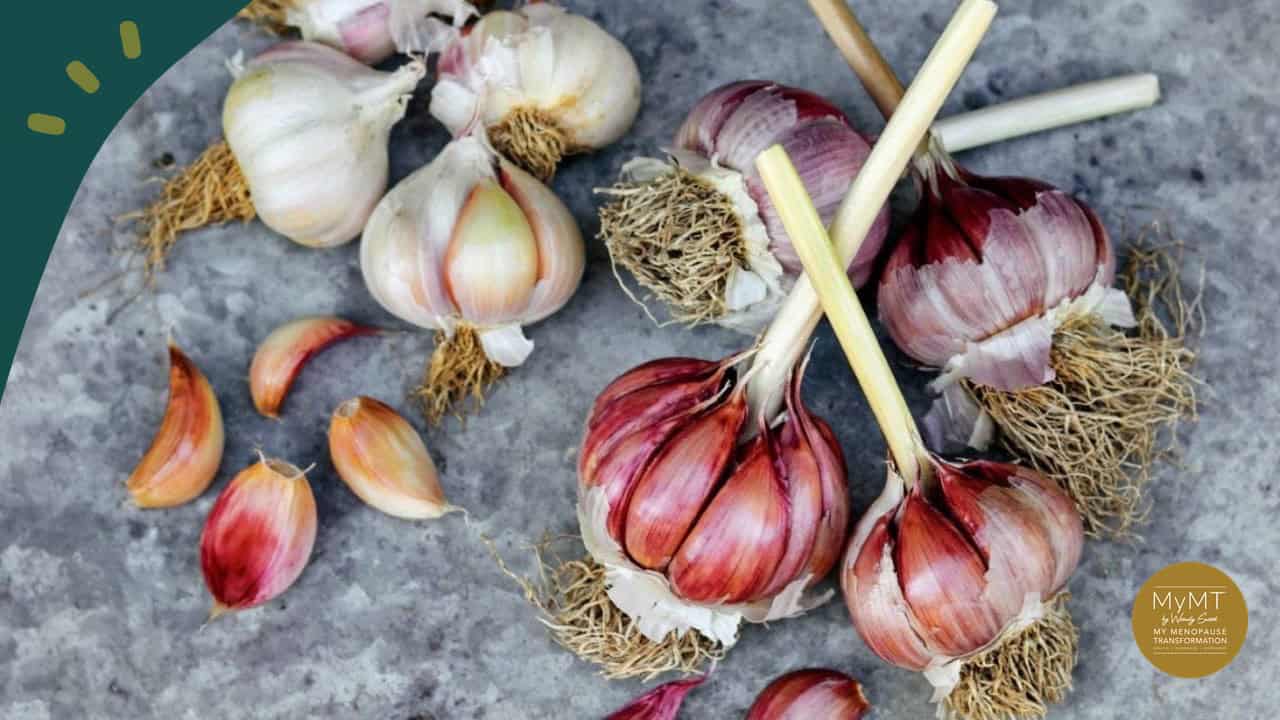I wish my late mother had added more garlic to her meals. Maybe then she would not have needed all the heart pills that were prescribed for her as she got older. On reflection the decline happened in her late 50’s and 60’s – yes, her post-menopause years. My greatest regret is that I hadn’t, at the time, explored the women’s healthy ageing research, so I didn’t know how to help her adjust to her changing cardiac health in post-menopause – although to be fair, some of the research hadn’t even been undertaken.
After some very busy weeks packing up our house, decluttering (I recommend it!) and re-locating as well as Christmas and New Year, I’m finally getting organised with my new year routine. Purchasing garlic was top of my list of functional foods to stock up on. I add it to soups and my roast vegie salads. Garlic features in numerous recipes in the MyMT™ Food Guide. With a focus of ‘Food as Medicine in Menopause’ in both my programmes, women know to add garlic to their meals when they can, especially if they have changing cardiac health in post-menopause.
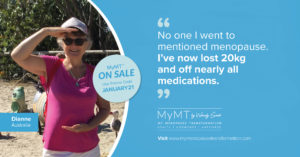
Getting back into a routine to re-set your metabolism, when you’ve been busy and distracted with all the events happening around the world is important – especially when it comes to food. Our hormones like to be in a routine. They like predictability. So when we have times that we are out of our routines, we need a routine re-set. One of the first things I do when I’ve been away is fill my empty fridge with lovely anti-oxidant vegies and fruits. Yesterday, I went to my local fruit and vegetable shop and filled my basket with everything I needed over the next few days to help boost my immune system and improve my heart health. This included garlic.
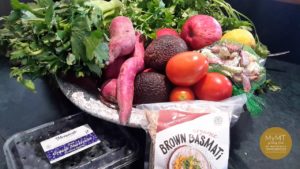
Garlic has been used for thousands of years to boost immune health. It features in the Mediterranean Dietary approach that I take on the MyMT™ programmes because it’s important for women transitioning menopause to have the specific compounds in garlic, which help to dilate ageing blood vessels that are losing elasticity. As such, it helps to maintain a healthy blood pressure. This is important for those of you who are still perplexed as to why you are having hot flushes, when you are now in your post-menopause years.
I’m always telling the MyMT™ community how ageing affects our blood vessels and for all of us, this starts during menopause. Many of you with varicose veins will already have seen how quickly blood vessels lose elasticity and permeability. Be mindful of the fact that some of these varicosities in your veins, may be superficial and you can see them, but others may be deeper and you can’t see them. If you have aching legs every evening and you are already overweight and/or stand a lot at work, then wear support stockings as athletes do, and eat your garlic!
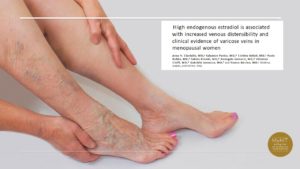
Blood vessels have oestrogen receptors in them. The consequence of this is that as oestrogen declines in the body as we move through menopause, our blood vessels become less elastic. It’s a normal part of our biological ageing and it’s why many of you may not be recovering well from your exercise sessions. Your tolerance to heavy exercise changes as your hormones change in menopause and your blood vessels become less elastic. This slows your recovery.
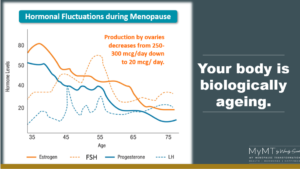
This is why the types of food and nutrients we add to our diet are important. Adding garlic, beetroot and celery to your diet will give you beautiful blood-vessel-dilating magic. These foods are all part of the Mediterranean diet as well.
I first heard about the powerful effect of Kyolic garlic when I attended the Australasian Lifestyle Medicine conference last year. Listening to lead researcher, Professor Karin Ried, I was fascinated with the long-term studies that our mother’s generation didn’t get to know about. Kyolic garlic has been aged for 20 months. The compounds in this aged garlic is well evidenced in helping to normalise blood pressure as we age and take 5 years off your biological ageing as well as prevent some cancers [Ried et.al., 2018, The GarGIC Trial].
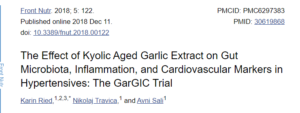
In clinical trials Garlic significantly lowered central blood pressure, pulse pressure (the difference between systolic and diastolic measurements) and arterial stiffness.
But perhaps of greater significance to women in menopause, was that Vitamin B12 status also plays a role in the responsiveness to garlic on blood pressure. This interested me, because many women move from peri-menopause whereby they are still menstruating (albeit erratically) to post-menopause, whereby their periods have stopped for a year or more, so Vitamin B12, Folate and Ferritin (stored iron) status can fluctuate hugely over this time-frame. That’s why it pays to get your Doctor to test these important nutrients in your blood work.
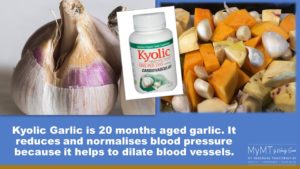
Whilst I cook with locally-grown garlic in my cooking, Kyolic Garlic is sold as a supplement. I now have a bottle of it in my pantry. When I began to research many of the expensive menopause symptom reduction supplements and found that they were not as well evidenced as we might believe, I removed many of them out of the pantry and into the bin. Kyolic garlic is one of these well-evidenced supplements.
Using nutrients to offset arterial stiffness as we get older is important. This is because improving vascular stiffness is related to better heart health and aerobic fitness, while the risk of cardiovascular disease is reduced.
The clinical GarGIC trial also showed that Kyolic Garlic has pre-biotic properties as well. This was evidenced in improved gut microbiota and higher microbial richness and diversity in trial participants. According to the researchers, there was a marked increase in Lactobacillus and Clostridia species after 3 months of supplementation. I’m not surprised at this one, because as a young Physical Education student at Otago University, I heard Clinical Nutritionist, Professor Jim Mann talk about this 30 years ago as well. I had forgotten that over the years. To help absorb the immune-boosting compounds in garlic, we also need Vitamins B12, B6 and Folate in the pathway. This is also why this wonderful immune-boosting nutrient was on my nutritious leafy-green salad yesterday too.
One of the things that I not only talk about in my Masterclass on Menopause seminar (now available for you online) and in my programmes, is that the social, economic and political landscapes have changed so much over our life-time and this includes with food production. This means that the choices we have around our food choices are often over-whelming with lots of different advice given. Like many women I have spoken to when I was taking my live events before the pandemic, I became confused as well.
As we go through menopause and into our post-menopause years though, what we need to get back to is simplifying our food shopping and preparation as well as keeping our diet as natural and as wholesome as possible. This is especially so for our generation because of the influence of all the processed foods, alcohol and medicines that are now known to have changed our gut microbiome, small intestine and liver health over our lifetime. Then when menopause arrives, our changing oestrogen levels have an influence on our gut health too. It’s a double-edged sword, which I explain in my GUT HEALTH module.
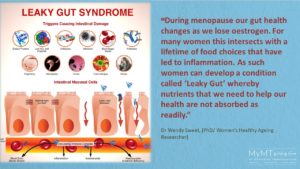
This was reiterated to me recently when the Lancet Medical Journal reported on a large study about the effects of diet on lifestyle disease as we age. The time frame for the study resonated with me too because the researchers had looked at global health statistics between 1990 to 2017 – the period through which there has been the most change in food production and of course food marketing. In 2017, 11 million deaths and 255 million nutritional-related disabilities were attributable to dietary risk factors – these included high intake of sodium from processed foods, low intake of whole grains and low intake of fruits and vegetables.
As the lead researcher stated, “Countries where people eat a Mediterranean diet — high in heart-healthy fats and fibre — scored the best results, with Israel ranking No.1 in terms of the least number of diet-related deaths. Afshin [the lead researcher] defined the Mediterranean diet as one with a high intake of fruits, vegetables, nuts and healthy oils, such as olive oil.”
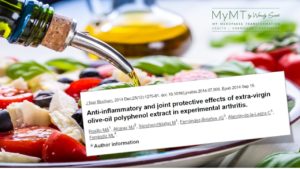
I no-longer get swayed by the food marketing that has appeared on the TV, magazines, diets and on supermarket-shelves. We’ve been subjected to this advertising for decades, but much of it doesn’t necessarily suit us in menopause. This is why I only follow the nutritional research that has been conducted on women in mid-life and older. As I often say in my Masterclass on Menopause seminar, our menopause transition is the gateway to a new stage of our life – our biological ageing … and I want you all to feel healthy as you move into the next phase of your life.

For too many years, menopause has been medicalised and seen as ‘problematic’. But as it is the opposite life-stage to puberty, why is this?
That was my curiosity when I embarked on following research on women’s healthy ageing. That was the start of turning around my own symptoms when HRT and supplements failed to give me precious sleep and failed to restore me to a healthy blood pressure as well as improved joint and gut health too. One of the things I did, was linked to getting beautiful Kyolic Garlic into me and adding it into my soups and salads too.
All of this information and so much more is in the powerful My Menopause Transformation programmes. If symptoms are getting your down, I hope you can join me one day too. For those who are interested in my Transform Me weight loss programme, then this is on my annual January sale.
If you aren’t overweight, then please look at my Circuit Breaker programme, which is on the link below. This also continues on sale too. Please use promo code JOIN MYMT to access this discount.
Wendy Sweet, PhD/ MyMT Founder & Coach/ Member: Australasian Society of Lifestyle Medicine
References:
Health effects of dietary risks in 195 countries, 1990–2017: A systematic analysis for the Global Burden of Disease Study. The Lancet Online, April 3, 2019 http://dx.doi.org/10.1016/S0140-6736(19)30041-8
Ried, K., et al (2018). The Effect of Kyolic Aged Garlic Extract on Gut Microbiota, Inflammation, and Cardiovascular Markers in Hypertensives: The GarGIC Trial. Frontiers in Nutrition, 5, 122
